Russia aims to triple its LNG production by loosening Gazprom’s grip on exports
Proposal would exempt greenfield projects in remote north from Gazprom gas transmission monopoly

Proposal would exempt greenfield projects in remote north from Gazprom gas transmission monopoly
